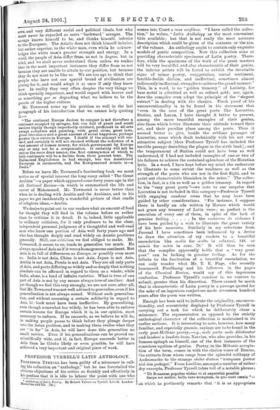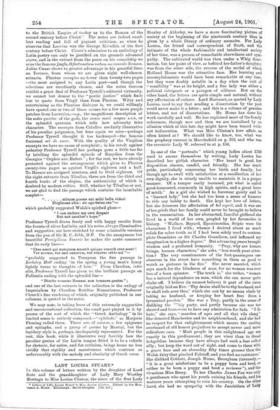PROFESSOR TYRRELL'S LATIN ANTHOLOGY. PROFESSOR TYRRELL has been guilty of
a misnomer in call- ing his collection an "anthology," but he has forestalled the obvious objections of his critics so frankly and effectively in his preface that it is idle to labour the point with one who • Anthology of Latin Poetry. By Robert Telverton Tyrrell, Litt.D. London : Maennllan and Co. Pia] comes into Court a reus confitens. "I have called the collec- tion," he writes, "Latin Anthology as the most convenient title available ; but that is not really the moat accurate description which could be.given of the contents or the aim of the volume. An anthology ought to contain only exquisite models of poetic composition. Now this collection aims at providing characteristic specimens of Latin poetry. There- fore, while the specimens of the work of the great masters will be very beautiful, and also characteristic of their genius, the inferior artists will be found to exhibit the invariable signs of minor poetry, exaggeration, unreal sentiment. forcible-feeble diction, and ineffectual, sometimes almost ludicrously ineffectual, struggles to achieve the grand manner." This, in a word, is no " golden treasury " of Latinity, for base metal is admitted as well as refined gold ; nor, again, does the compiler even adopt the principle of the "elegant extract" in dealing with the classics. Fresh proof of his unconventionality is to be found in his statement that "even in the case of the great poets like Lucretius, Statius, and Lucan, I have thought it better to present, among the more beautiful examples of their genius, also those which better illustrate their attitude toward their art, and their peculiar place among the poets. Thus it seemed better to give, beside the sublime passages of Lucretius, some which dealt technically with his not very attractive subject [thus Professor Tyrrell has included the terrible passage describing the plague in the sixth book] ; and the temperament of Statius could not have been so well understood, if I had not included examples of one or two of his failures to achieve the sustained splendour of the Horatian lyric. In a word, I have kept before my mind the endeavour to illustrate to some extent the weakness as well as the strength of the poets who are not in the first flight, and to point out characteristic blemishes in the notes." The collec- tion, in fact, is a tin as well• as a golden treasury. In regard to the " very great poets "—we note to our surprise that Lucretius is not included in this category—Professor Tyrrell with engaging candour owns that he may have been guided by other considerations. " For instance, I suppose there is hardly an. ode written by Horace which would not grace any treasury of Latin verse ; so perfect is the execution of every one of them, in spite of the lack of genuine feeling In the embarras de rich eases I have been guided by a wish to illustrate the great variety of his lyric measures. Similarly in my selections from Juvenal I have sometimes been influenced by a desire to draw the attention of my readers to a beautiful emendation like mulio for multo in cclxxxvi. 148, or minus for minis in ccxc. 70." It will thus be seen that the compiler apparently holds' that a " very great poet" can be lacking in genuine feeling. As for the tribute to the fascination of a beautiful emendation, we can only wonder what Mr. T. E. Page, who recently hammered Peerlkamp and his followers in the pages of the Classical Review, would say of this ingenuous confession. Professor Tyrrell's candour is, we venture to submit, greater than his discretion. There cannot be much that is characteristic of Latin poetry in a passage quoted for the sake of an ingenious conjecture made seventeen hundred years after the poem was written.
Enough has been said to indicate the originality, unconven- tionality, and eccentricity displayed by Professor Tyrrell in carrying out a task for which he deliberately chose a misnomer. The representative as opposed to the strictly anthological character of the collection is maintained in its earlier sections. It is interesting to note, however, how many familiar, and especially gnomic, sayings are to be found in the early post-Hellenic poetry,—e.g., male parks male dilabunbur and /audari a laudato from Naevius, who also provides, in his famous epitaph on himself, one of the first instances of the conscious egotism of genius. Poetry, in the Miltonic accepta- tion of the term, comes in with the clarion tones of Ennius, the extracts from whom range from the splendid soliloquy of Andromache to the strange obiter dictum "nunquam poetor nisi aim podager." From Lucilius, amongst a number of rather. dry excerpts, Professor Tyrrell takes toll of a notable phrase:
"Ut Romans populus victus vi et superatns proeliia Saepe est muftis, hello vero nunquatn, in quo sunt omnia "- on which he pertinently remarks that " it is as appropriate utinam posses uni mihi bells videri Displicsai aliis : sic ego tutus ero"— which probably suggested Walsh's spirited gloss-
" I can endure my own despair But not another's hope."
Professor Tyrrell draws freely and with happy results from the founts of silver Latinity, and his notes, always illuminative and suggestive, are here enriched by some admirable versions from the pen of Sir R. C. Jebb, M.P. On the anonymous but beautiful Pervigilium Veneris he makes the, acute comment
that its early lines-
" eras amet qui nunquam amavit quique amavit eras amet ! Ver novuto, ver jam canorum, ver renatus orbis est "— " probably suggested to Tennyson the fine passage in Locksley Hall ending in the spring a young man's fancy lightly turns to thoughts of love.' " From Claudian, inter cilia, Professor Tyrrell has given us the brilliant passage on Pollentia ending with the splendid line-
" Discite vesanae Roman non temnere gentes" ; and one of the last extracts in the collection is the eulogy of Imperialism by Claudius Rutilius Numatianus, Professor Church's fine rendering of which, originally published in our columns, is quoted in the notes.
We may note, in taking leave of this extremely sugges tive and unconventional collection, the small part played in it by poems of the sort of which the " Greek Anthology " in its limited sense is entirely composed,—" ephibols," as Marjorie Fleming called them. There are, of course, a few epigrams and epitaphs, and a group of poems by Martial, but the lapidary style is, perhaps, inadequately represented. For the rest, this book, while it illustrates very forcibly how the peculiar genius of the Latin tongue fitted it to be a vehicle for rhetoric, for satire, and for criticism, brings home no less vividly that rigidity and massiveness which contrast so unfavourably with the melody and elasticity of Greek verse.
to the British Empire of to-day as to the Roman of the second century before Christ." The notes are indeed excel- lent reading and full of piquant criticism, as when he observes that Laevius was the George Meredith of the first century before Christ. Cicero's admission to an anthology of Latin poetry can only be justified on the grounds advanced above, and in the extract from the poem on his consulship we miss the famous jingle, 0 fortunatam natam me consul° Bantam. Julius Cesar shows to greater advantage in his graceful lines on Terence, from whom we are given eight well-chosen extracts. Plautus occupies no fewer than twenty-two pages —the most assigned to any Latin poet—and though the selections are excellently chosen, and the notes thereon exhibit a great deal of Professor Tyrrell's editorial virtuosity, we cannot but demur to the " poetic justice" which finds leas to quote from Virgil than from Plautus. Witty and entertaining as the Plautine dialogue is, we could willingly have spared one or two of these scenes for a few more purple patches from Lucretius,—e.g., the magnificent description of the seder quietae of the gods, the suave marl magno IC.T.A, or the splendid quatrain which tells how adversity tries character. The excerpts from Catullus are fairly illustrative of his peculiar poignancy, but here again we miss—perhaps Professor Tyrrell thought it too hackneyed—the famous fraternal cri de cceur. With the quality of the Virgilian excerpts we have no cause of complaint ; in his revolt against pedantry Professor Tyrrell has perhaps gone a little too far by labelling the splendid episode of Eurydice from the Georgics " Orphee aux Enfers " ; for the rest, we have already protested against the arrangement which gives to Plautus twenty-two pages as against Virgil's eighteen and a half. To Horace are assigned nineteen, and to Ovid eighteen. Of the eight extracts from Tibullus, three are from the third and fourth books, of the elegies, the authenticity of which is doubted by modern critics. Still, whether by Tibullus or not, we are glad to find the passage which contains the inimitable couplet-



































 Previous page
Previous page